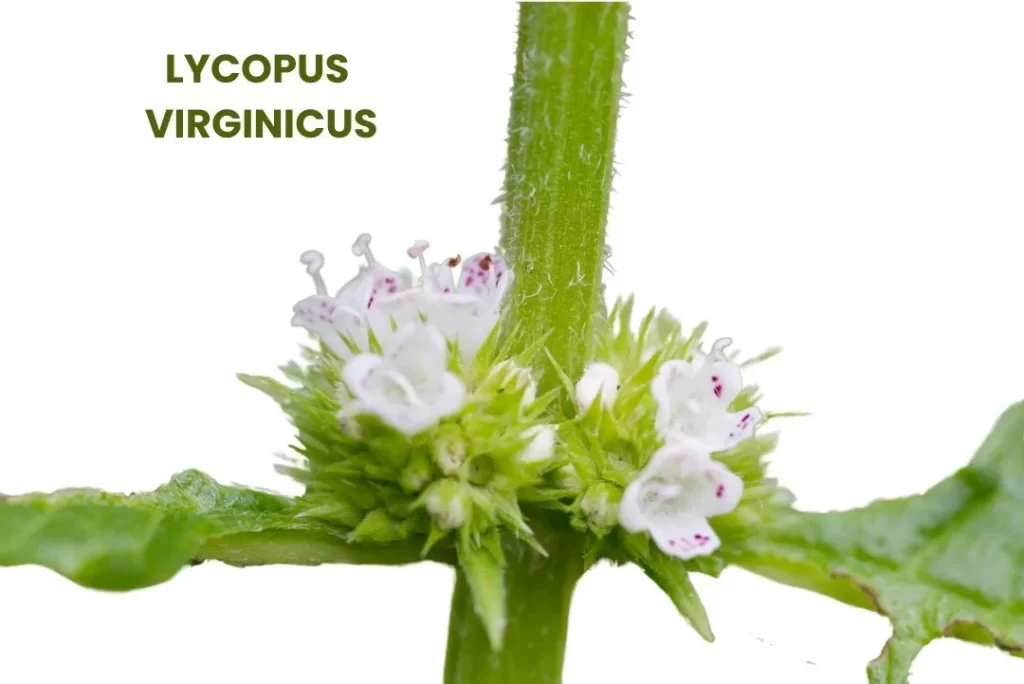Lycopus virginicus, commonly known as Bugle-weed, is a homeopathic remedy used primarily for its effects on the cardiovascular system.
It is known for lowering blood pressure, reducing heart rate, and increasing the length of systole.
This remedy is also effective in treating passive hemorrhages, exophthalmic goiter, and hemorrhoidal bleeding.

Table of Contents
ToggleSOURCE INFORMATION
Scientific Classification
- Kingdom: Plantae
- Clade: Angiosperms
- Clade: Eudicots
- Order: Lamiales
- Family: Lamiaceae
- Genus: Lycopus
- Species: L. virginicus
Botanical Description
- Lycopus virginicus is a perennial herb that grows up to 1 meter tall.
- It has square stems, lance-shaped leaves, and small white or pale pink flowers.
- The plant is commonly found in moist, shaded areas such as marshes and along streams in North America.
Origin and Historical Facts
- Origin: Native to North America.
- Historical Uses: Traditionally used by Native Americans for treating various ailments, particularly those related to the heart and thyroid.
- Homeopathic Use: Introduced into homeopathy for its specific action on the cardiovascular system and its ability to address heart-related conditions.
Phytochemistry
- Main Components: Contains phenolic acids, flavonoids, and essential oils.
- Medicinal Properties: Known for its anti-inflammatory, astringent, and sedative properties.
DRUG PATHOGENESIS
- Primary Action: Lycopus virginicus primarily affects the cardiovascular system, leading to lowered blood pressure, reduced heart rate, and increased systole duration.
- Secondary Action: It also impacts the respiratory and urinary systems, causing symptoms such as wheezing, cough, and changes in urine flow.
KEY CHARACTERISTICS
- Cardiovascular: Lowers blood pressure, reduces heart rate, increases systole duration, and addresses passive hemorrhages.
- Exophthalmic Goiter: Useful in cases of toxic goiter, especially in the pre-operative stage.
- Hemorrhoidal Bleeding: Effective in treating bleeding from hemorrhoids.
PARTICULAR ORGAN SYMPTOMS
HEAD
- Frontal Headache: Intense headache, particularly in the frontal eminences.
- Nosebleed: Frequent bleeding from the nose.
EYES
- Protrusion: Eyes appear to be pushed outward, often associated with tumultuous heart action.
- Supraorbital Pain: Pain above the eyes, accompanied by aching in the testicles.
MOUTH
- Toothache: Pain in the lower molars.
HEART
- Rapid Heart Action: Fast heartbeat, especially in smokers.
- Praecordial Pain: Pain in the area over the heart.
- Cyanosis: Bluish discoloration of the skin due to poor circulation.
- Tumultuous Heart Action: Strong and irregular heartbeats, often with palpitation and oppression around the heart.
- Cardiac Asthma: Wheezing and difficulty breathing due to heart issues.
RESPIRATORY
- Wheezing: Difficulty breathing with a wheezing sound.
- Cough: Coughing with small but frequent bleeding (haemoptysis).
URINE
- Profuse Flow: Increased flow of clear, watery urine, especially when the heart is irritable.
- Scanty Urine: Reduced urine output.
- Bladder Distension: Feeling of fullness in the bladder even when empty.
- Diabetes: Useful in managing diabetes-related symptoms.
- Pain in Testicles: Discomfort or pain in the testicles.
RECTUM
- Bleeding: Bleeding from the rectum.
- Hemorrhoids: Effective in treating hemorrhoidal bleeding.
SLEEP
- Wakefulness: Difficulty sleeping due to active but weak circulation.
- Morbid Vigilance: Excessive alertness and inability to sleep.
MODALITIES
- Worse from: Activity, heart irritation, emotional stress.
- Better from: Rest, calm environment, regulated heart function.
RELATIONSHIP WITH OTHER DRUGS
Compare with
- Ephedra (Teamsters Tea): Effective in exophthalmic goiter, especially with protruding eyes and tumultuous heart action.
- Fucus: Known for treating thyroid-related conditions.
- Spartein: Used for cardiovascular conditions.
- Crataegus: Useful in heart diseases.
- Adrenaline 6x: Used for passive hemorrhages.
DOSE
- Potency: Typically used in potencies ranging from the first to the thirtieth (1X, 1C to 30X, 30C).
- Dosage: The exact dosage and frequency should be determined by a homeopathic practitioner based on individual symptoms and response to treatment.
Frequently Asked Questions
What are the main indications for Lycopus virginicus?
- Lycopus virginicus is primarily indicated for cardiovascular conditions, exophthalmic goiter, hemorrhoidal bleeding, and passive hemorrhages.
How should Lycopus virginicus be taken?
- It is usually taken in potencies ranging from 1X to 30C. The exact dosage should be determined by a homeopathic practitioner.
Are there any side effects of using Lycopus virginicus?
- In homeopathic doses, side effects are rare. However, if symptoms worsen or new symptoms appear, it is advisable to consult with a homeopathic practitioner.
Can Lycopus virginicus be used alongside conventional medications?
- Yes, but it is important to inform your healthcare provider and homeopathic practitioner about all the medications and treatments you are currently using to avoid potential interactions.
What should I do if I experience worsening symptoms?
- If symptoms worsen, contact a homeopathic practitioner or healthcare provider to reassess the treatment plan.
What does “systole” refer to?
- Systole is the phase of the heartbeat when the heart muscle contracts and pumps blood from the chambers into the arteries.
What is “cyanosis”?
- Cyanosis is a bluish discoloration of the skin and mucous membranes due to poor circulation or inadequate oxygenation of the blood.
Lycopus virginicus is a versatile homeopathic remedy addressing a range of symptoms, particularly those related to the cardiovascular, respiratory, and urinary systems.
Always consult with a qualified homeopathic practitioner for personalized treatment and dosage.
